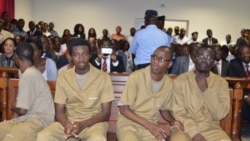In Angola, the three most important human rights abuses during 2015 were cruel, excessive, and degrading punishment, including reported cases of torture and beatings; limits on freedoms of assembly, association, speech, and press; and official corruption and impunity – that is the finding of the U.S. Department of State’s Country Reports on Human Rights Practices for 2015, released in April.
The report is released annually on human rights practices around the world. The report for Angola also discussed other human rights abuses, including arbitrary or unlawful deprivation of life, harsh and potentially life-threatening prison conditions, arbitrary arrest and detention, lengthy pretrial detention, impunity for human rights abusers, lack of due process and judicial inefficiency, forced evictions without compensation, restrictions on non-governmental organizations (NGOs), trafficking in persons, limits on workers’ rights, and forced labor.
The Angolan government took some steps to prosecute or punish officials who committed abuses; however, accountability was weak due to a lack of checks and balances, lack of institutional capacity, a culture of impunity, and widespread government corruption.
But recent events continue to cause concern for human rights in Angola. The United States publicly expressed concern over the harsh sentences an Angolan court handed down in March to 17 civil society activists, noting that their conviction threatens the exercise of the freedoms of expression and peaceful assembly in Angola. Their sentences range from two years to and eight and a half years in prison.
The activists, known as the 15+, were arrested last June, reportedly after a peaceful political discussion about democracy and governance.Two other activists were later charged with crimes. The 15+2 were eventually convicted in March of “preparatory acts of rebellion” and “criminal conspiracy.”
Secretary of State John Kerry said the annual human rights report renews the U.S. commitment “to promoting and protecting universal human rights, to supporting and defending civil society in its peaceful efforts to hold governments accountable, and to working with our partners to advance peace, development, human rights, and democracy.”






